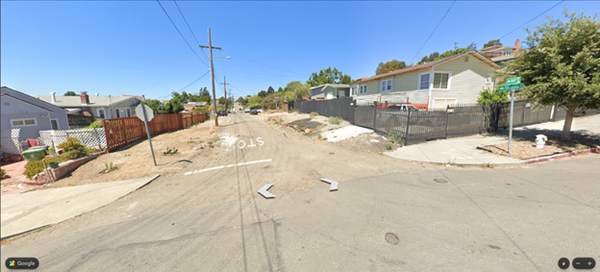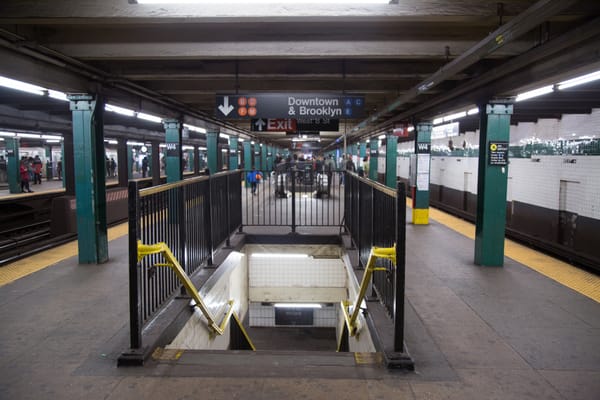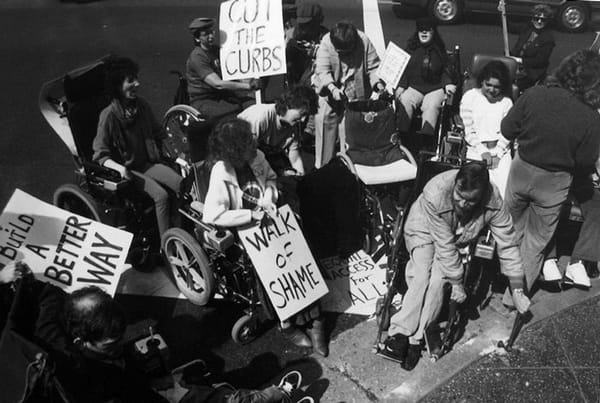6/22/25: Caregiving Crises and a Novel Approach to Paratransit

Caregivers – the workers that support people with disabilities (PWDs) with activities of daily living (ADLs) like bathing, dressing, and housework – are in crisis. You might have heard them called personal care attendants (PCAs), “attendants,” home health aides, or direct support professionals (DSPs, who only work with people with intellectual and developmental disabilities). But no matter the name or clientele, there’s a massive shortage of caregivers and most are underpaid. 2024 median pay for Home Health and Personal Care Aides was $34,900 per year ($16.78 per hour), or just 112% of the poverty level for a family of four. Pay also varies widely across states, from an average low of $10.60 in Louisiana to $18.72 in Alaska, and the number of caregivers per 100,000 state residents varies almost fourfold, from 7.1 in Georgia to 28.3 in New York. And the national caregiver shortage is only projected to get worse: a 2021 report by the Global Coalition on Aging (GCOA) found that in the US, “a national shortage of 151,000 care workers will exist by 2030, and a 355,000-caregiver shortfall by 2040.”
Low pay and inadequate workers leave shifts uncovered, drive PWDs from living independently to living in understaffed nursing homes, and force nursing homes and other supported living environments to scale back services or shut down entirely. This week, that manifested in an announcement by Texana, a Texas-based operator of group homes for people with developmental disabilities, that it will be closing 13 homes serving a combined 54 people in September. Texas has a state average pay of $11.47 for Home Health and Personal Care Aides – just 68% of the national average – and one third of caregiver jobs in the state are vacant. In many ways, states like Texas are a bellwether for what we’ll all face in the coming years. It’s just a matter of time until other states feel the same crunch.
Advocates had reason for hope when the Better Care Better Jobs Act (BCBJA) was introduced in 2021 and subsequently became part of the original Build Back Better reconciliation bill. BCBJA promised $400 billion for caregiver training, better pay and expanded Medicaid home and community-based services (HCBS). But despite endorsements by over 500 organizations, it was a casualty of BBB negotiations and left out of the bill. Now, we are faced with policies that seem designed to make things worse.
I talked a couple weeks ago about how Trump’s immigration policies threaten the stability of the hospital workforce. Those same policies are threatening the care economy too. While foreign-born workers make up 19% of the overall workforce, they’re more than 41% of home health aides, 28% of personal care aides, 22% of nursing assistants and 30% of nursing home housekeeping and maintenance workers. But as Axios covers, Trump’s suspension of refugee programs is keeping would-be nursing home ancillary staff abroad; revoked work visas and canceled temporary protected status (TPS) programs are removing existing caregivers and support staff; and ICE deportations of caregivers are leaving folks with intellectual and developmental disabilities and dementia asking, “where’s my trusted friend?”
Meanwhile, Medicaid cuts in the pending reconciliation bill will increase the number of hours unpaid caregivers have to cover and will push more friends and family into unpaid caregiving. The Wisconsin Examiner covers a few ways this might happen, both for PWDs whose Medicaid-covered hours have been scaled back and for those who are kicked off Medicaid entirely. There are also roughly 4 million unpaid caregivers on Medicaid, with an unknown chunk set to have their Medicaid coverage scaled back or canceled – steps that will endanger their health and their ability to provide that unpaid care. Obviously, people with disabilities will be hard-hit by Medicaid cuts, but it’s important to recognize that their caregivers are being sacrificed too. If the care economy crumbles, we are all at risk.
But the news still has its bright spots. In Oregon, TriMet (the Portland -area public transit agency) has launched a new pilot of TriMet NEXT, a micro transit service for seniors and people with disabilities. TriMet NEXT is a novel twist on paratransit that operates through a rideshare-like app and provides both direct trips and trips to fixed-route transit stops. It was first rolled out in April to LIFT paratransit riders in Gresham, a city of roughly 112,000 that sits just east of Portland and features two MAX light rail stations. This kind of responsive micro transit is miles better than conventional paratransit, which often requires multiple days' advance notice and only provides a multi-hour pickup window. Another story this week from Abilene, Texas shows how bad conventional paratransit can be (and how advocates are fighting for better service); in contrast, TriMet NEXT has gotten universally positive reviews and seems to be an unmitigated success.
The new, expanded pilot is open to seniors and people with disabilities across south Gresham – a part of town chock-full of newer subdivisions bordering small farms, rural homes and woods. Now, I think this is a great program that’ll help residents in south Gresham – and is far better than the situation in, say, Abilene. But I’ve gotta note that TriMet NEXT’s expanded service is in the harder-to-navigate part of town that might still be forest and farmland if the Portland area had allowed denser development (and might be easier to navigate if it wasn't for America's obsession with winding subdivisions). Basically, it’s good that there’s a more responsive last mile service for seniors and PWDs in sprawly areas, but the money spent on TriMet NEXT would go farther if the Portland area (and south Gresham specifically) didn’t have so much sprawl in the first place.
You win some (transit), you lose some (land use).


And in your regular reminder that NIMBYs are awful people, comfortably-housed folks in Newtown, Connecticut are opposing the rezoning of 5 acres of land to build a 21-unit senior apartment complex because it would “ruin the neighborhood’s character,” with some saying the only reason for the rezoning is to feed the developer’s greed. (Not to, like, house seniors). One of the NIMBYs has even hired a lawyer to fight it and others are acting like entitled children:
“This neighborhood was zoned (residential) for a reason – to maintain a quiet, safe and family-friendly environment. Changing that designation would not only disrupt the character of our community, but it would have a direct, negative impact on existing property owners like myself who have invested here under the assumption that zoning protections would be upheld.” – David Taylor, Newtown NIMBY
So… Don’t be like David. Support senior housing, even if it’s at the neighborhood-character-killing, Hong Kong-like density of 4 homes per acre.
In other news:
Construction begins on first LGBTQ+ affirming housing for older adults | CBS Austin
Sarasota-Manatee seniors face rising health issues related to housing | Herald-Tribune
Affordable Vancouver housing helps tackle climate, housing crises | The Narwhal
An Oakland neighborhood's campaign against sideshows has become a fight with the city | Oaklandside
Nasa data reveals dramatic rise in intensity of weather events | Extreme weather | The Guardian
Cuts to FEMA's storm prep program hammer communities that voted for Trump | CBS News
Fossil fuel billionaires are bankrolling the anti-trans movement | Heated
Senators demand Trump immigration officials stop using Medicaid data | AP News
DWP's new PIP points test could see 800,000 people lose £4,500 a year in benefits | Daily Star
Parents say federal cuts have slowed civil rights investigations : NPR
Medicare’s Financial Health Worsens | AARP
Republicans Threaten a Hospital Apocalypse - The American Prospect
Fallowed Fields Are Fueling California’s Dust Problem - Eos
Sacramento overhauls development process to speed up housing projects | Fox 40
Planetary waves linked to wild summer weather have tripled since 1950, study finds | AP News
As Wildfires Increase, NJ Considers the Impact on Public Health - Inside Climate News
California preps for intense fire season – as Trump slashes federal aid | The Independent
Kristi Noem demands more control over FEMA, Homeland Security funding | CNN Politics
Chemical Safety Board to disappear under Trump's orders | Grist
Climate Change Will Bankrupt the Country - The American Prospect
AI boom means regulator cannot predict future water shortages in England | Water | The Guardian
Rising heat in Karachi deepens divide between rich and poor - The Daily Climate




